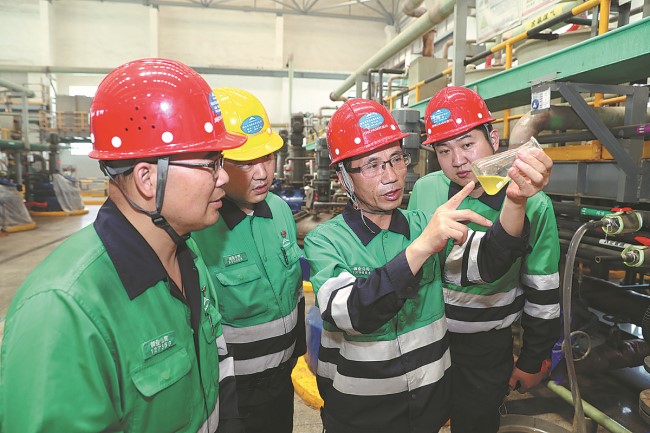Delegate masters art of precious metal extraction

Pan Congming (second from right), addresses queries from other workers on precious metal extraction and refining at a facility in Jinchang, Gansu province, in August. [Photo/China Daily]
Originally an apprentice and now a top technician in the precious metal extraction and refining field, Pan Congming, 52, demonstrates how personal efforts can contribute to the nation's development.
Head of the precious metal refining department at a subsidiary of Jinchuan Group Co Ltd in Gansu province, Pan was elected as a delegate to the 20th National Congress of the Communist Party of China, which is proposed to be convened in Beijing on Oct 16. For him, it is like "a reward" for his dedication to improving the extraction and refining processes for precious metals.
"China's reserves of precious metals account for only about 0.39 percent of the world's total. Without advanced technologies, some precious metals are often merely byproducts of general commodity mining and can only be treated as waste — a huge loss for the country," Pan said.
Precious metals such as platinum, palladium, rhodium and iridium are key basic materials for high-tech product manufacturing such as electronics, aeronautical engines, fuel cells, chips and optic fibers.
Jinchang, home to Pan, is known as a nickel hub in China. Jinchuan Group's nickel copper ore, and slag waste like electrolytic nickel slag and anode slime, have abundant reserves of platinum group precious metals.
Among them, nickel anode slime is one of the main raw materials used in the extraction of platinum group metals. How to make extraction and recycling processes clean, environmentally friendly and efficient have always been problems hindering the high-quality development of precious metal smelting that Pan aimed to tackle.
"When I joined the company about two decades ago, I often heard colleagues telling a story of China trading 73 metric tons of wheat and 15 tons of shrimp for merely 500 grams of platinum group metals. The development of extraction and purification techniques lagged behind demand. And I convinced myself that I must achieve something to help my nation in this very field."
At that time, Pan was only an apprentice. For him, it was not typically within his scope of abilities to try and master the refining technology of platinum group metals.
To master related techniques, Pan has read more than 120 technical books and wrote notes of over 300,000 words over his 26 years of related experience, which led him to his innovations and breakthroughs in improving equipment performance for precious metal extraction and refining.
Pan has undertaken nine national and provincial level scientific research projects, completed 228 innovative projects, owns 31 nationally authorized patents and published 21 scientific papers on major journals, which are considered to be of a high academic level and valued by many libraries nationwide.
Pan's invention of "green and efficient extraction technology of platinum, palladium, rhodium and iridium in nickel anode slime" has greatly simplified the purification process of platinum group precious metals, which not only saves on costs, but also is more environmentally friendly. The technology can extract eight kinds of precious metals from nickel ore waste, and the purity of each precious metal can reach 99.99 percent.
"I'm never afraid of failure. Only through failure do I know that I need to take another approach to succeed," he said.
Pan's hard work has won him national-level prizes including national model worker and national technical expert.
At present, Pan is committed to cultivating young talent. "I will retire one day and hope my apprentices can continue to be devoted to this field," he said.
